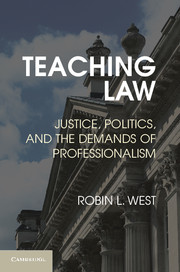Book contents
- Frontmatter
- Dedication
- Contents
- Acknowledgment
- Introduction The Trouble with Law Schools
- 1 The Unbearable Lightness of Justice
- 2 Politics and Its Discontents
- 3 The Bifurcated Academy: The Practice versus the Study of Law
- 4 Confronting Our Existential Challenge
- Some Conclusions
- Bibliography
- Index
- References
Introduction - The Trouble with Law Schools
Published online by Cambridge University Press: 05 June 2014
- Frontmatter
- Dedication
- Contents
- Acknowledgment
- Introduction The Trouble with Law Schools
- 1 The Unbearable Lightness of Justice
- 2 Politics and Its Discontents
- 3 The Bifurcated Academy: The Practice versus the Study of Law
- 4 Confronting Our Existential Challenge
- Some Conclusions
- Bibliography
- Index
- References
Summary
The Economic Crisis
The American legal academy is in a world of trouble. Some reasons for that are now familiar, both in and outside law schools. Most important, law graduates in large numbers are not finding legal jobs. Law firm work is being outsourced, being scaled back, or being done by non–partnership-track contract attorneys working for much less than traditional associates, or simply not being done at all. As a result, out-of-work or never-employed law graduates, many of them carrying between $100,000 and $200,000 worth of student debt, are now as ubiquitous in the bartending and cab-driving professions as the proverbial humanities majors. A number of credible studies show that sizable percentages of the still-growing numbers of the Great Recession–era graduates of law schools will never find legal work. Equally responsible forecasts suggest that even in a fully recovered economy, the legal profession will be radically restructured, with far fewer jobs in major firms serving large corporate clients – the slice of the profession disproportionately responsible for attracting college graduates to law schools in the first place.
The second source of trouble, also a familiar one by now, is entirely of the law schools’ own making. In a fit of short-term thinking that blotted out long-term consequences, many law schools, using the thinnest of rationales, continued to report to the American Bar Association (ABA) during the first few years of the recession – and hence during a time of plummeting legal employment – that their own recent graduates were still finding jobs at astonishingly high rates – in the mid-ninetieth percentile or higher. The ABA in turn reported these statistics to the US News and World Report (USNWR), the law schools’ equivalent of a rating agency. Those rates were then published in the USNWR’s annual “rankings” guide of law schools, on which college seniors rely when making the decision on whether and where to go to law school.
- Type
- Chapter
- Information
- Teaching LawJustice, Politics, and the Demands of Professionalism, pp. 1 - 42Publisher: Cambridge University PressPrint publication year: 2013



